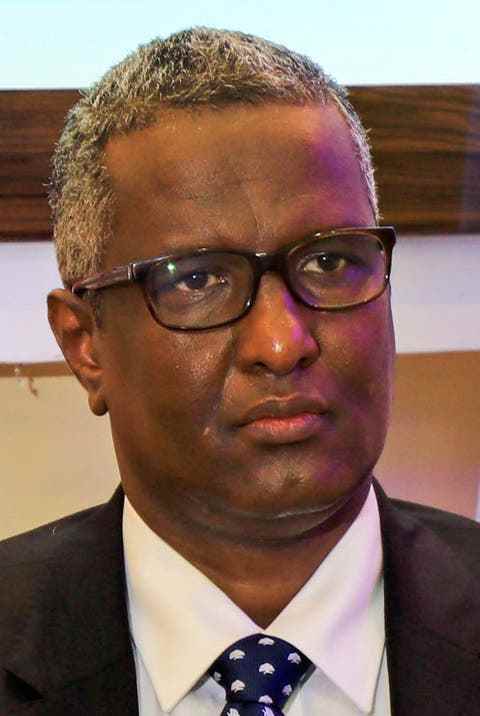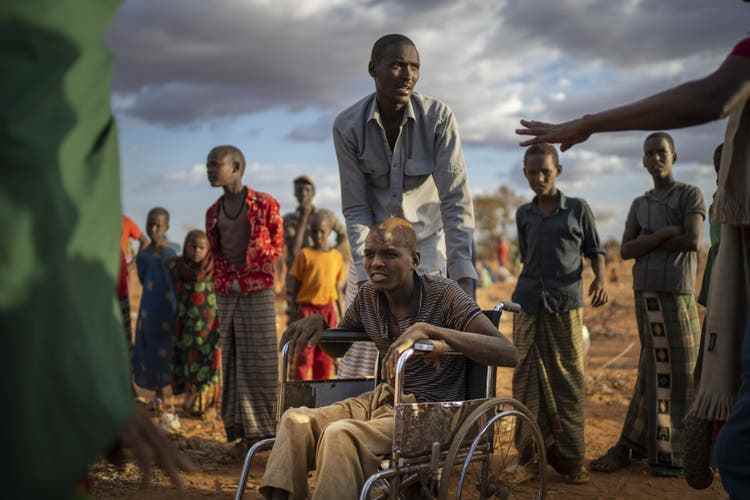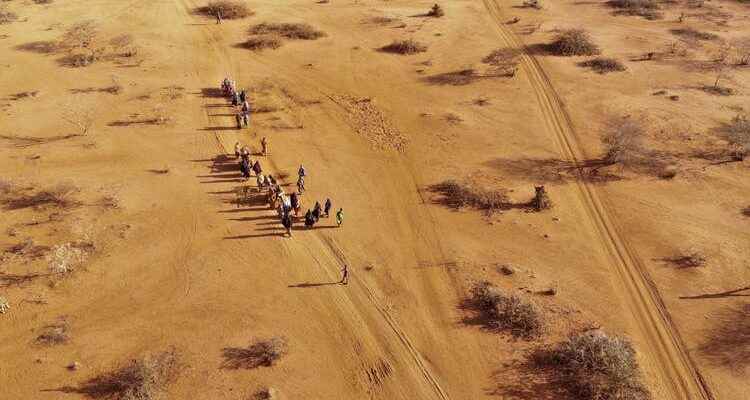Somalia faces anxious weeks. To prevent famine, his country needs more support, says the government’s special envoy. He sees a particular responsibility in those countries that have caused climate change the most.
people fleeing hunger. The recording from September 21, 2022 comes from the edge of the Somali village of Dollow.
He’ll be flying home in three hours, says Abdirahman Abdishakur in the lobby of a Zurich hotel and smiles. “It’s about time. I’ve been away for a long time and I’m tired.”
The journey behind the tall man with horn-rimmed glasses lasted six weeks. From the Arabian Gulf it led to various European capitals, then to North America and finally to Switzerland.
Abdishakur was appointed special envoy to combat drought by the Somali government last summer. His job: to remind the world, which is currently devoting much of its attention and resources to Ukraine, that catastrophe is looming in the Horn of Africa.
Somalia is experiencing its worst drought in four decades, and the last four rainy seasons have failed. A famine could be declared this year in the country battered by crises.
Five weeks ago you made an urgent appeal to the world. “The window to saving tens if not hundreds of thousands of lives in Somalia is closing fast,” you said at the time. What is the situation today, Mr. Abdishakur?
There has been some progress in financing the emergency response. Some donor countries – above all the USA – have increased their grants. That helps, but it’s not enough. Almost eight million people in Somalia are currently affected by the drought, and 500,000 are already undernourished. Without further help there will be famine.

Abdirahman Abdishakur.
What about those who already have too little to eat today?
Many of those affected live as farmers in the countryside. They have lost their livelihood due to the drought and are now fleeing to the cities for food to survive. The situation there is also tense given the influx of hundreds of thousands. There is a lack of food, water and medical support. The Somali government lacks the money to help. That’s why we need international support – also in the sense of justice.
What do you mean by justice?
This drought is a consequence of climate change. We didn’t cause it, but we are suffering the consequences. That is why supporting Somalia is not only about charity, but also about justice. Those who cause climate change should help Somalia – also in the longer term. Famines can only be avoided in the future if we arm ourselves better against extreme weather events.
According to this logic, shouldn’t you also make non-Western countries more responsible, for example the oil-rich Gulf States or China?
You are right, China is the second largest emitter of CO2 and does not provide humanitarian aid in Somalia. I’ve also been to five Gulf States and asked for support. There are private initiatives and organizations that help. At the government level, things are different.
What are the direct consequences of Somalia continuing to lack funds to stem the worst effects of the drought?
It’s simple: people die. This drought is comparable to that of 2011, when 250,000 people died. Now that threatens to happen again.
Famines are always the result of political failure. Shouldn’t Somalia’s political elite also be held responsible for the impending catastrophe?

Displaced people wait in the camp near Dolow in mid-September to be assigned a spot for their tent.
Of course we are responsible! It is up to us to build functioning institutions in the country and to generate the funds that are needed. Somalia would be a rich country with many raw materials. However, the longstanding conflict has set us back. Now we are trying to rebuild Somalia. Progress has recently been made, for example in the fight against the terrorist militia al-Shabab. Fighting the drought is therefore not only about saving human lives, but also about safeguarding the progress made in recent years.
In Europe, the focus is on the war in Ukraine. Does that make your job as a special envoy more difficult?
The situation in Ukraine has pushed the crises in Somalia and elsewhere in Africa into the background. Given the current security risks for Europe, I can understand that to a certain extent. But it is important not to forget other crises. Those who see it as a moral responsibility to defend another country’s sovereignty should also help prevent famine. It is a disgrace to the international community that people continue to die of hunger in the 21st century.
Large parts of Somalia are still controlled by armed groups, in particular by the Islamist terrorist militia al-Shabab. How to help the people living in such areas?
Most aid organizations no longer distribute food to those affected, but money. This way they can cover themselves. Many people in Somalia use mobile payment systems. They can receive money even if there is no direct access to them. An alternative is to have the aid distributed through local religious leaders. Al-Shabab accepts this more than direct aid from international aid organizations.
There have recently been increasing reports that the local population is increasingly rebelling against al-Shabab. What does that have to do with the drought?
Al-Shabab collects taxes in these areas. If you don’t have any money, you have to give up part of the harvest. If you don’t have that either, you sometimes have to hand over a son to the terrorists as a fighter. For a long time they endured this in silence. In the current emergency situation, that has changed. People would rather die with dignity than submit. For us, this is a chance to liberate more areas. But it is important that we can offer the people something after the liberation: humanitarian support, schools, courts, a police station. But here, too, we depend on help – and this help is very difficult to get at the moment.
